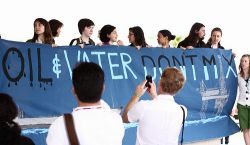Halifax Media Co-op
News from Nova Scotia's Grassroots
Halifax Youth Report from the Cancún Climate Summit
While the mood in Cancún is much more subdued than at last year's summit in Copenhagen, the Canadian Youth Delegation to Cancún is doing its best to keep tabs on Canada's federal negotiators.
Robin Tress is a Dalhousie University student whose blog appears here. Her most recent posting is below. Emilie Novaczek studies at King's College and is also blogging from Cancún here.
Greenwashing at its Finest
Written by Robin Tress
Today I did some conference tourism – I went to the Water Dialogues around Climate Change, and the UNEP Climate Action Cocktail Party. The Dialogues mostly covered water infrastructure adaptation plans for central and south American countries, and the Climate Action party covered mostly nothing useful. There was a large display of ´green´products like compostable take-out containers, compostable coffee cups, biodegradable diapers, corn-based white out, and eco-friendly cosmetic containers. After inspecting the booth and deciding that those products were not “green” but were instead contributing to the disposable culture that got us into this mess in the first place, I had the great fortune of being cornered in the bathroom by a woman who worked for the greenwashing company.
(I would also like to add that this Climate Action party was held at Hotel Now Sapphire Riviera, which was probably the most over-the-top hotel I´ve ever been to. The bathroom in which I was approached by the greenwashing woman was bigger than the hostel that the entire CYD is staying in for 2 weeks. Very contradictory to climate action ideals).
“Have you seen our products? We make things like my iPhone case, diapers, coffee cups and shampoo bottles, from plant materials instead of petroleum products,” she said. Of course the converstation continued, and I learned that these products were made from corn. Not the husk, not the waste product, but the kernel. I asked about the subsidization of corn in the USA and the fact that using corn as cash-crops in many countries creates huge food insecurities and loss of ecological integrity, I was quickly informed that, ¨that food security issue is really a non-issue, and was just propaganda produced by Frito-Lay and Doritos because they wanted to keep cheap corn for their own productions and not allow bioengineering companies to get their hands on it.¨ The conversation continued in a very roundabout way, until I received a high-five for “asking all the right questions” and was told to “keep on fighting! Youth are the future!”
This is a caution to people who are tempted by green consumerism. The idea that disposable and non-essential products cant be “green” is inherently flawed. The best way to reduce your consumer footprint is to consume less! Reduce, reuse, recycle (there is a reason that reduce and reuse are first, and you´ll notice that there´s no ´throw it out and by a new one´on that list)! If you´re worried about being blinded by greenwashing, check out the 7 Sins of Greenwashing, and next time you´re out shopping for something new, ask yourself these questions: do I need this product? Where did its materials come from? How long will they last? At the end of this product’s life, where will it go?
The site for the Halifax local of The Media Co-op has been archived and will no longer be updated. Please visit the main Media Co-op website to learn more about the organization.



